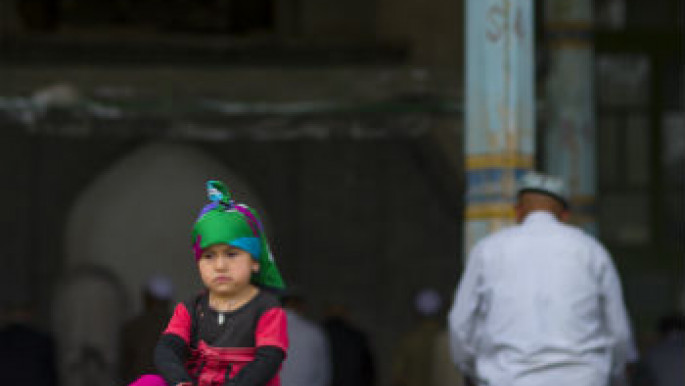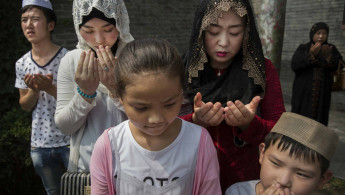Chinese authorities ban Muslim children from attending religious events over winter break
The educational authorities in China's Linxia county are enforcing new measures to further curb the influence of religious education in the strictly secular country.
2 min read
China's Hui Muslim minority are the new targets of the crackdown on religious education [Getty]
Educational authorities in a Muslim-majority county in China have banned children from attending any religious events over their winter holiday, as part of the country's continuing crackdown on religious education.
The education bureau of the Linxia district in Western China's Gansu province, posted a notification online detailing that school children were banned from entering religious buildings, as well as from reading scriptures in classes or in religious buildings. Authorities added that pupils and teachers should take notice of the announcement, and work to strengthen political ideology and propaganda, according to reports by Reuters.
Gansu province is home to many Chinese Muslims of the Hui ethnic group, many who have Arab or Persian ancestry dating back to the Silk Road and Mongol dynasty.
The Chinese government is undertaking a continued crackdown on religious practice and religious education.
Last week the Chinese authorities demolished a well-known evangelical "mega-church" in northern China's Shanxi Province, as the Communist party strives for total political and social control.
 |
|
| Uighur Muslim children in Xinjiang province are also barred from attending religious events [Getty] |
Tensions between the Chinese state and the Muslim community are particularly pronounced, most notably in northwest China's Xinjiang province, where there are stirs of separatist movements among the region's Turkic-speaking Uighur Muslims who have been repeatedly oppressed by the authorities. Children in Xinjiang are also banned from attending religious events.
In May last year, authorities banned Muslim parents from giving their children Islamic baby names, such as Muhammed and Jihad, but the Islamophobic social restrictions pervade even deeper than this.
Amnesty International's annual 2016-2017 report claims that in Xinjiang the government "continued to violate the right to freedom of religion, and crack down on all unauthorised religious gatherings," despite the government's claims of progress on maintaining "social stability".
Officially, Chinese law grants religious freedom for all. However, regulations on education and "protection of minors" also dictate that religious education cannot interfere with state education, or be used to "coerce" children to believe.
The government announced new regulations on religious affairs in October last year, which are due to take effect in February. The new laws aim to increase oversight of religious education, as well as generally expanding regulation of religious activities.
Agencies contributed to this report





 Follow the Middle East's top stories in English at The New Arab on Google News
Follow the Middle East's top stories in English at The New Arab on Google News


